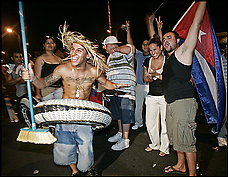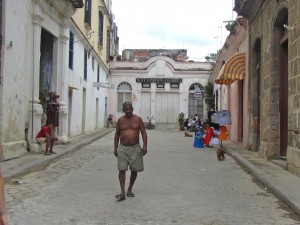Thoughts on the future of the Cuban Revolution
May 1, 2012 by andoyle
In early August of 2006, when it was announced that Fidel Castro was ill and he would be temporarily ceding power in Cuba to his brother Raul, celebrations erupted in Miami as the exile community awaited the “death of the dictator” and the inevitable collapse of his regime. Lisandro Perez, Cuban scholar from Florida International University, describes this “rupture” or “fall” scenario, which is the prevailing scenario of change in Cuba among the exile community in Miami. “The scenario is predicated on the primacy of personal authority, or caudillismo: once el hombre fuerte with the power is gone, it all falls like a tower of cards. In his essay “Reflections on the Future of Cuba,” Dr. Perez explains how this view is deeply rooted in a history and political culture of personalism. In the past when other strongmen have left, change has been ushered in almost immediately: Gerardo Machado in 1933 and Fulgencio Batista in 1959. Arturo Cobo, a Cuban exile activist, interviewed for an article on Miami’s reaction to Castro’s illness, said that this was an event that the exile community had been waiting for. “After he’s dead, anything is possible.’’ Cobo said “There is exultation and joy in the exile community tonight.”
Yet what should be cause for concern is the fact that it is not just the exile perspective of how change in Cuba will occur, but also the U.S.’s policy on Cuba that is based on a rupture scenario. This view is reflected in the official documents that sketch out Washington’s Cuba policy. The 2004 Report of the Commission for Assistance to a Free Cuba outlines recommendations for efforts to “hasten” Cuba’s transition. It then provides detailed guidelines for the direct U.S. involvement in basically all aspects of Cuban national life, “from health and education, to governance, justice, and the economy, even to the administration of a national park service (complete with the training of rangers), the establishment safe and drug-free schools, ESOL (English-for-speakers-of-other-languages) programs in the schools, and the distribution of toolkits for parental involvement in their children’s education.” This level of U.S. involvement (plans for a protectorate some argue) is grounded on the prediction that change in Cuba will happen overnight and does not allow for the possibility of an alternate scenario. One that, given the course of recent events in Cuba, seems much more likely: the continuation of the political order beyond the presence of Fidel, and now Raul, Castro.
Many scholars support this scenario and are thus critical of the U.S.’s “failed policy” towards Cuba. Lissando Perez argues “the likelihood of continuity, or a slow evolution, rather than a rupture.” There are many complex reasons. For one, he maintains that the Cuban Revolution “has successfully portrayed itself as the founder and trustee of an entire social, political, and economic system with institutions that will survive even the loss of the historical leader of the revolution.” The revolution brought changes that transformed people’s lives for the better, a fact many Cuban’s won’t be quick to forget. Yoel, our tour guide while in Cuba, told the story of his father, who grew up in poverty in the rural outskirts of Havana. He a young man when the revolution triumphed and was then able to go to university to study engineering thanks to the new government’s education reforms. “I wouldn’t have the life I live today had it not been for the revolution,” Yoel said to me.
Dr. Perez also credits the revolution’s success to the fact that it capitalized on political values and ideals that had long been part of a Cuban national identity, but that the Cuban Republic had failed to realize: “sovereignty, social justice, the dignity of all its people, and a national purpose guided by a history of exceptionalism that gave Cubans a particular sense of destiny as an independent nation in this hemisphere.” The genuine efforts to address the grave socioeconomic inequities of the past and the real accomplishments achieved towards that goal have been the lasting legacies of the revolution. And it’s this legacy that goes beyond the political symbolism and propaganda of the revolution and will certainly outlive its original leaders.
But the costs of these successes are something Cubans are painfully aware of. Economic austerity, housing shortages, severe food rationing, low wages, a debilitating dual economy and the loss of personal freedoms mark the daily lives of Cubans. Clearly something in Cuba has got give. Furthermore, economic reforms and liberalization in Cuba are already underway. But change means something different in Havana than it does in Washington or Miami.
I talked to a young man called Eddy who was trained as an agricultural engineer, but currently works as a bartender in a resort in Varadero and asked him how he felt about the revolution and what he saw for Cuba’s future. “I’d like to see the best of socialism and the best of capitalism, even if that meant paying a tax or some sort of insurance for health and education. But what needs to change is wages, to have them reflect the work we do. Because Cubans are very hard working people,” he said. He also spoke of how younger generations are losing faith in the government, while at the same time acknowledging the social improvements the revolutionary government has delivered. During our conversation I mentioned that I live in Honduras, one of the poorest countries in the region, whose capital city has one of the highest crime rates in the world and he immediately pointed out that as much as Cubans complain about their situation, the alternatives in most of their neighboring countries in Latin America and the Caribbean are hardly preferable. “You could walk out of the hotel right now, by yourself in the middle of the night and you’d be completely safe, not only because owning a weapon is illegal in Cuba, but because Cubans have no reason to harm you.” It was refreshing to finally hear a Cuban voice an impression that had seemed striking to me since our first few days in Havana. While many of my American classmates were shocked at how low the standards of living seemed to be in Cuba, after having lived in Honduras and Bolivia, I was pleasantly surprised. The quality of life seemed vastly higher in Cuba and there wasn’t the gross inequity of wealth that characterizes most of the developing world.
A taxi driver that took a group of us to Finca Vijia echoed Eddy’s sentiment. Although he said he hardly made enough money to get by working as a taxi driver and that the dual economy and the low wages were the main problem in Cuba, he also stated that “Cuba es el mejor país del mundo para vivir.” Cuba is the best country in the world to live in, he said, and he wouldn’t leave even if he had the chance. After being in Cuba for two weeks, and talking to many others like Eddy and that taxi driver, I think it’s fair to say that there are lots of Cuban’s who are not ready to throw the revolution out with Fidel. What exactly is in store for Cuba in the coming years, though, is hard to say.
Sources:
http://www.washingtonpost.com/wp-dyn/content/article/2006/08/01/AR2006080101405.html
http://www.cigarenvy.com/2006/08/01/miami-cubans-await-news-on-fidel-castro-health-crisis/
Lisandro Pérez. “Reflections on the Future of Cuba.” Cuban Studies, vol. 39 (2008)
Leave a Reply
You must be logged in to post a comment.

